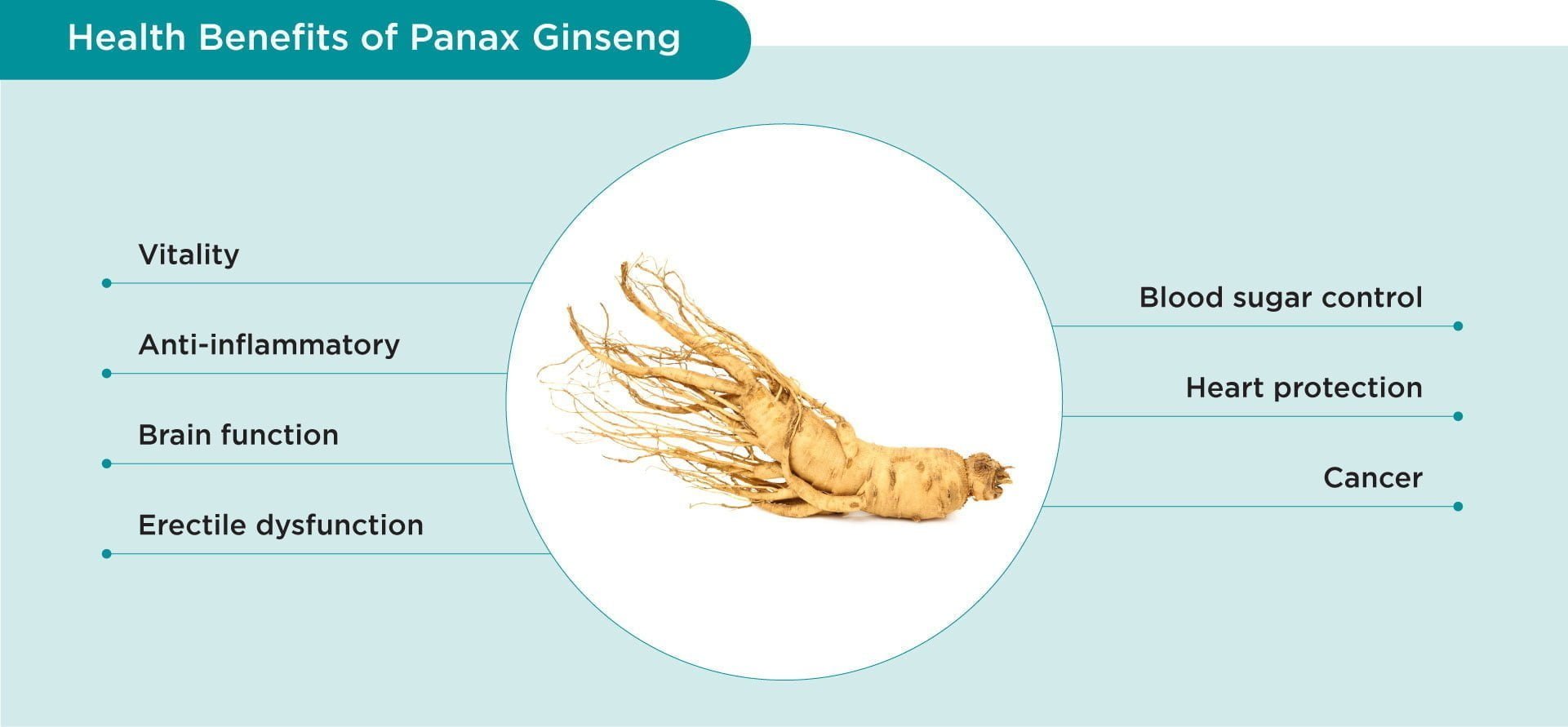Panax ginseng

Panax ginseng
Panax ginseng is a slow-growing perennial plant with fleshy roots that grows in mountainous areas of Korea and Northeast China, and usually harvested when the plant is three to six years old 1. Panax ginseng commonly called Korean ginseng, which has a short root and possesses antioxidant, anticarcinogenic, antidiabetic and anti-stress effects. In Korea, various processing methods have been developed to increase the efficacy and widen the clinical applicability of ginseng 2.
Nutritional Facts
Approximately 200 substances have been isolated from Panax ginseng. Of these, the major and most unique constituents are ginsenosides, compound K, acidic polysaccharides and polyacetylenes 2.
Published Health Benefits
1. Vitality
Panax ginseng has been shown to promote energy and enhance stamina and strength in individuals 1.
2. Anti-inflammatory
The bioactive component of Ginseng, Ginsenosides has antioxidant and anti-inflammatory properties. It has been shown to help reduce inflammatory markers and increase antioxidant capacity in cells 1,2.
3. Brain Function
Components in ginseng, like ginsenosides and compound K, could protect the brain against damage caused by free radicals. It can boost mental performance and concentration ability, prevents memory loss and safeguards against mental decline related to age 1.
4. Erectile Dysfunction
Panax ginseng improves muscle relaxation in the penis and enhances blood flow in the penile muscle, thereby helps to restore normal function 3.
5. Blood Sugar Control
Panax ginseng increases insulin production, enhances blood sugar uptake in cells, and provides antioxidant protection 1.
6. Heart Protection
Ginsenosides play a primary role in preventing cardiovascular disease through improving blood circulation and regulating blood pressure and blood lipid 2. It also stops the platelet from sticking together thus reducing the formation of blood clots in the artery, which can be beneficial for individuals with heart impairment 2.
7. Cancer
Ginsenoside, Polyacetylene and Acid polysaccharides in Panax ginseng have anticancer effects. An observational study suggested that people taking ginseng are less likely to develop certain types of cancer, such as lip, mouth, oesophagus, stomach, colon, liver and lung cancer 4.
References:
1. Khaled, R., Gabriele, G, & Wolf-Dieter, R. (2020). Use of ginseng in medicine: perspectives on cns disorders. Iranian Journal of Pharmacology and Therapeutics, 3(2), 30-40. https://tspace.library.utoronto.ca/handle/1807/8915
2. Kim, J. H. (2018). Pharmacological and medical applications of Panax ginseng and ginsenosides: a review for use in cardiovascular diseases. J Ginseng Res, 42(3), 264-269. https://doi.org/10.1016/j.jgr.2017.10.004
3. Jang, D. J., Lee, M. S., Shin, B. C., Lee, Y. C, & Ernst, E. (2008). Red ginseng for treating erectile dysfunction: a systematic review. Br J Clin Pharmacol, 66(4), 444-450. doi: 10.1111/j.1365-2125.2008.03236.x
4. Yun, T. K., & Choi, S. Y. (1995). Preventive effect of ginseng intake against various human cancers: a case-control study on 1987 pairs. Cancer Epidemiol Biomarkers Prev, 4(4), 401-408. https://cebp.aacrjournals.org/content/4/4/401.long








